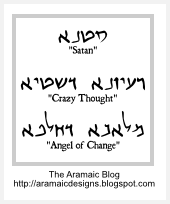
I’ve been aware of Victor Alexander’s website V-A.com for quite some time now. It was one of the very first places on the Internet which sported an Aramaic Bible translation, and it today has a significant amount of web traffic each month.
As of late, however, I’ve noticed links popping up often on Twitter, sporting that Alexander’s work comes from “Galilean” Aramaic and sure enough when clicking through (at least as of March 7th) I found claims that it was from “the Galilean dialect of the Ancient Aramaic.”
However, listening to the audio recordings, such as his recording of the Lord’s Prayer, it is immediately evident that there is little “Galilean” (such as Jesus’ dialect of Old Galilean, a Western ‘Old Aramaic’ dialect) about his work, and that it instead rests very heavily upon the Syriac Peshitta (a work composed in Classical Syriac, an Eastern ‘Middle Aramaic’ dialect).
An an example of this, allow me to provide his rendition of the Lord’s Prayer:
Galilean transliteration of the Lord’s Prayer
(from v-a.com)
Avvon d-bish-maiya, nith-qaddash shim-mukh.
Tih-teh mal-chootukh. Nih-weh çiw-yanukh:
ei-chana d’bish-maiya: ap b’ar-ah.
Haw lan lakh-ma d’soonqa-nan yoo-mana.
O’shwooq lan kho-bein:
ei-chana d’ap kh’nan shwiq-qan l’khaya-ween.
Oo’la te-ellan l’niss-yoona:
il-la paç-çan min beesha.
Mid-til de-di-lukh hai mal-choota
oo khai-la oo tush-bookh-ta
l’alam al-mein. Aa-meen.
First of all when listening to the audio recording, the first red flag to stick out was his pronunciation:
- He pronounces soft kaf like “CH” in “choo-choo-train.”
- Endings that were classically pronounced “-akh” he pronounces as “-ukh.”
- He pronounces soft beyt as “W” in all contexts rather than a mixture of “V” and “W“.
These are not Galilean features.
They are features seen in Neo-Aramaic dialects.
Secondly, there are matters of morphology. Where there are many more, these are the most obvious and glaring:
- What he shows as “nith-qaddash” and “nih-weh” would have been closer to “yith-qaddash” and “yih-weh” in Jesus’ dialect.
- “kh’nan” would have been, at least in written form, “enan” although the gutturals overall would have been softened in Galilean and sometimes written differently.
These are Eastern Aramaic (specifically Syriac) features, but this is no surprise as upon further examination what he was trying to call “Galilean” Aramaic was simply taken verbatim from the Syriac Peshitta.
As far as I am able to ascertain, there is nothing about this translation that places it closer to Jesus’ language than any of the other “Aramaic Bible” Translations out there. 🙂
So, when you read over his website (or any other website that sports “original Aramaic” claims), keep this information in mind and compare the language features. If you see one “nethqadash” (or something like it in the Lord’s Prayer) you know you’re probably looking at Syriac.
Peace,
-Steve



